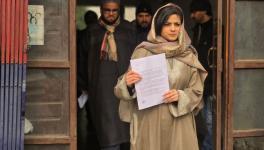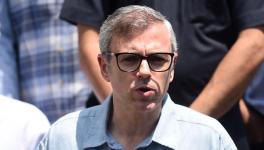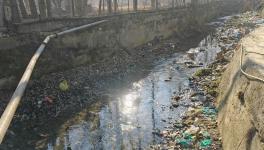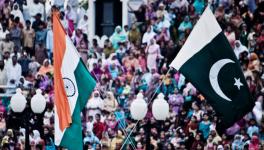NC Members Barred from Holding Prayer Ceremony on Sheikh Abdullah’s Birth Anniversary
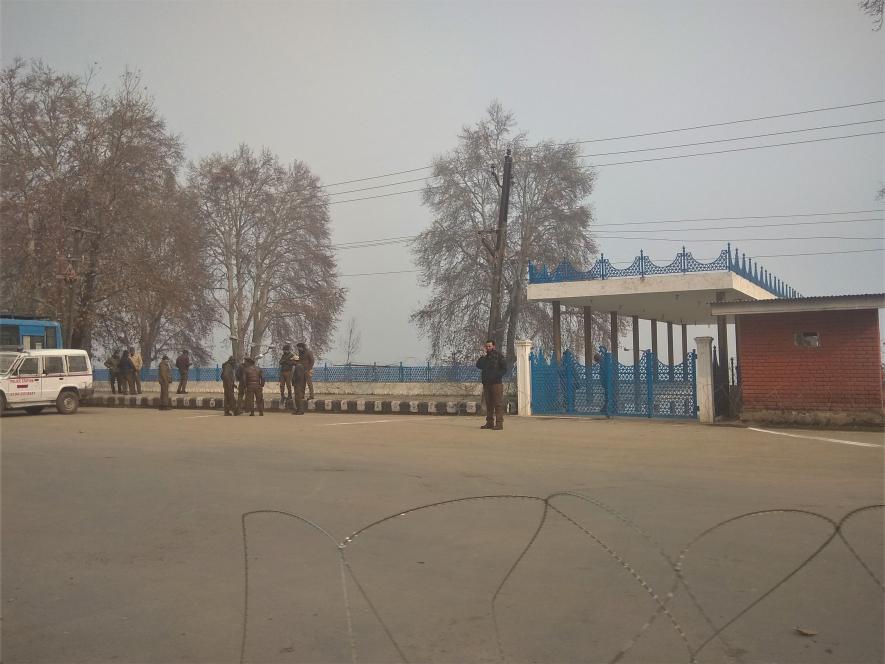
Srinagar: On the 114th birth anniversary of the founder of National Conference (NC), workers and party members of Kashmir’s grand old party were barred from holding a congregational prayer ceremony at the tomb of Sheikh Abdullah, a first since his death in year 1982.
According to NC’s provincial spokesperson Imran Nabi Dar, the party had written to administration asking for permission to hold the prayer meet. “But, we did not get any response from them. Seems like they did not want any gathering at his grave,” Dar told NewsClick.
Sheikh Abdullah is buried on the banks of Dal lake in Hazratbal, right outside the Kashmir University campus. His grave is manned by security personnel round the year, in the fear that his tomb may be ‘desecrated’ by Kashmiris, holding him responsible for acceding to New Delhi and subsequent political turmoil in the region.
On this birth anniversary, observed as a public holiday, the number of security guards around his tomb had been increased and the area secured. However, the security this time, NC members believe, was increased to stop even those who revere the leader as ‘Sher e Kashmir (Lion of Kashmir)’. Some did arrive at his tomb but only individuals were permitted.
Nonetheless, the party members held a commemorative function at its headquarters in Nawa e Subh complex in Srinagar but, without its senior leadership including Sheikh’s son Farooq Abdullah. His grandson Omar Abdullah was also not present. Farooq and Omar, along with the party’s leadership, have been detained since August 5, the day government abrogated Article 370, a move that the government knew will be thoroughly opposed by the regional parties like NC.
Also read: ‘Gupkar Declaration’ Likely to Be Cornerstone for Future of Kashmir Politics
Farooq has been confined at his home after being slapped with Public Safety Act (PSA) while Omar has been detained in a government accommodation turned sub-jail close to his residence at Srinagar’s Gupkar.
Many believe that the government’s policy towards Kashmir’s politics, especially with respect to Sheikh Abdullah and his party has been scarred in the fresh instance of crisis in the region since August. “There is a visible and apparent dichotomy and contradiction with which the government is dealing with the party and politics in general,” NC member and MP from Anantnag constituency, Hasnain Masoodi said.
Sheikh Abdullah was born in the outskirts of Srinagar city’s Soura locality in 1905 in a shawl weaver’s family. After his education from Aligarh Muslim University (AMU), he returned to Kashmir and became one of the leading political activists against the then Dogra regime. He established All Jammu and Kashmir Muslim Conference (MC) along with other leaders of the time including Mirwaiz Yusuf Shah and Choudhary Ghulam Abbas. The latter, however, parted ways with Sheikh Abdullah who then carved out the National Conference from MC in 1939.
Against the Dogra rule in Kashmir, Sheikh launched the Quit Kashmir Movement in 1941 and developed close ties with Congress leader Jawahar Lal Nehru. Their relationship formed one of the basis of Kashmir’s accession to India after the country achieved independence from the British imperial rule.
As a part of the accession agreement, Sheikh and Nehru laid down the basis for Article 370 which safeguarded the erstwhile princely state of Jammu and Kashmir with a ‘special status’ under Indian constitution. Sheikh was later jailed for another 11 years in 1953 while he was holding the post of Prime Minister of Kashmir. Sheikh and his party NC upheld the pro-India politics in Kashmir after he was freed in 1963 and resumed his political work.
Masoodi said that Sheikh is regarded as the ‘tallest leader’ in the region by everyone, cutting across party and ideological lines. “Today, his son and grandson are in jail even though neither them nor his party departed from the ideology New Delhi holds in great respect,” Masoodi said.
Also read: Article 370: Four Months of Shutdown, Violence, Intimidation and Misery
KK Sharma, adviser to J&K UTs Lt Governor at the 37th annual day function of the Sher-e-Kashmir Institute of Medical Sciences (SKIMS), which coincided with Sheikh's anniversary, lauded the leader. “Sheikh sahib was certainly the tallest leader, who conceived the ideas of changing the developmental scenario of J&K back then when it was needed the most,” Sharma said.
At his commemoration function at Jammu, NC party members while remembering Sheikh Abdullah for his revolutionary land reforms in J&K, adopted a resolution seeking release of all political leaders.
Even though the party had faced turbulence in 1953 when Sheikh was arrested, and in 1984, when Farooq’s cabinet was dissolved and the party was divided into two factions, this time the crisis—members of the party say—is unprecedented, as they battle to recuperate from the ongoing “political onslaught”.
Get the latest reports & analysis with people's perspective on Protests, movements & deep analytical videos, discussions of the current affairs in your Telegram app. Subscribe to NewsClick's Telegram channel & get Real-Time updates on stories, as they get published on our website.









